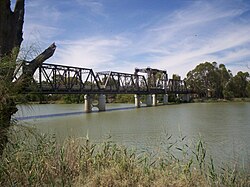Abbotsford Bridge | |
|---|---|
 Abbotsford Bridge from the Victorian riverbank | |
| Coordinates | 34°06′51″S 141°59′16″E / 34.1141°S 141.9879°E |
| Carries | Silver City Highway (as Calder Highway) |
| Crosses | Murray River |
| Locale | Curlwaa, New South Wales, Australia |
| Preceded by | George Chaffey Bridge |
| Followed by | Paringa Bridge |
| Characteristics | |
| Design | Allan truss vertical-lift bridge |
| Material | Steel |
| Total length | Approx. 240 m (790 ft) |
| Clearance below |
|
| No. of lanes | One (controlled by traffic lights) |
| History | |
| Constructed by | NSW Department of Public Works |
| Construction cost | A£78,000 |
| Opened | 14 April 1928 |
| Inaugurated | 28 July 1928 (by Dudley de Chair, Governor of NSW) |
| Replaces | Abbot's Ford punt |
| Location | |
 | |
| References | |
| [1][2][3][4] | |
Abbotsford Bridge is a steel Allan truss-type road bridge that carries the Silver City Highway across the Murray River, between Curlwaa in New South Wales, and Yelta in Victoria, Australia. It is the only remaining steel truss bridge with a lift span that crosses the Murray. Opened in 1928, the bridge was built by the NSW Department of Public Works and was designed by Percy Allan. It was the second last vertical-lift bridge to be built over the river, the last being the Nyah Bridge, which opened in 1941.[5]
The bridge was constructed over a three-year period from 1925. The project was not originally planned to take as long, but there were delays due to problems with a contractor, and industrial action. The bridge was designed to carry the Mildura railway line over the Murray River and into New South Wales, to service significant cross-border traffic arising from the fruit-growing industry, but the line was never extended beyond the terminus at Yelta. The bridge currently carries a single lane of road controlled by traffic lights.
In 1931, there was a major accident at the bridge when a paddle steamer clipped the lift span, tearing apart the upper deck of the boat.
- ^ "Schedule of Classified Roads and Unclassified Regional Roads" (PDF). Roads and Maritime Services. August 2013. pp. 0, 3, 7. Retrieved 27 August 2013.
- ^ "Abbotsford Bridge Over Murray River". State Heritage Register. NSW Environment and Heritage. 1998–2009. Retrieved 29 August 2013.
- ^ "Silver City Highway–Calder Highway intersection (Streetview)" (Map). Google Maps. Retrieved 28 August 2013.
- ^ "Abbotsford Bridge" (Map). Google Maps. Retrieved 28 August 2013.
- ^ "Nyah Lift Span Bridge". Wakool Shire Council. Retrieved 26 May 2014.